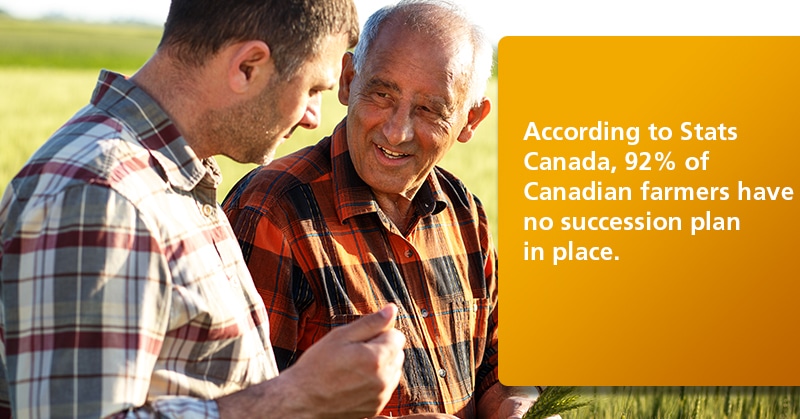Retiring from the family farm

As a farmer, you felt the pull of the land. You simply knew it was your calling to live and work on the farm, and you intend to do it for as long as you are able. Retirement may be the furthest thing from your mind. When you’re ready to leave the farm, you probably assume that it will be passed on to your children.
While it seems like a simple plan, it is anything but. There are many factors to consider such as your children’s willingness or ability to take over the farm, and your personal circumstances and financial requirements when it’s time to hand over the reins.
Can your children afford to buy the farm?
Your farm is your biggest asset, and it has likely increased in value considerably. Statistics Canada reports that farm values spiked nearly 40% per acre on average between 2011 and 2016. Should you want or need to sell the farm so you can retire, will your children be able to purchase it? If they require financial assistance, are they able to service a large debt working on your farm?
Can your children treat their home like a business?
On a farm, the lines between work and life are blurred because families usually live on the land. But today’s farm must be operated like a business and separating the two can be difficult. Additionally, managing a business entity requires the right education and training. Even if the interest is there, your children may not have the capabilities to run a farm operation.
Do your children want to be farmers?
Unless your children have been actively involved with your farm all along, they may be focused on different careers by the time you’re ready to turn over the reins. If there are multiple siblings, they may not all be interested in returning to farm life. Splitting the farm equally between your children could be detrimental to the business if they are divided on how to manage it or what to do with it.
You need a succession plan
A succession plan is the process of passing a farm on to another owner or owners as smoothly and successfully as possible. Even if you don’t see yourself retiring from farm life for many years, it’s wise to be prepared in the event that your circumstances change such as an accident or illness. You want to make sure that:
- Your farm is set up to thrive after your departure with the right owner(s) at the helm.
- You are able to maximize the value of your farm so you can be financially comfortable when you leave.
- You can depart on your own terms.
Creating a succession plan is like saving for retirement. It is a process that can take years to formulate. Transitioning ownership and management and being fair and equal to everyone requires considerable thought and planning.
The first stage is determining whether or not succession within the family is a viable option. This can be especially challenging because of the emotional attachment you have to your farm and your strong desire to keep it in the family. Some tough questions need to be considered:
- Are your child or children interested in succeeding you?
- Can your children afford to buy the farm from you?
- Do your child or children have the necessary skills to run the business?
- If you have more than one interested and capable child, you need to determine if one or more will succeed you. Remember that as more family members become involved, more income is needed to provide for them. Can the business support more than one family? Can your children work in partnership together successfully – and how will that partnership be structured?
- If one child is to succeed you, you might need to make provisions for the others to keep harmony in the family. For example, shares in the business or a life insurance policy that pays an inheritance to children not involved in the farm business.
Depending on your family dynamics, you may want to involve a family business advisor to help you work through this stage. If you conclude that succession in the family won’t work, you will need to look at other options such as selling the farm to extract the value of your assets.
The next stage is the development and implementation of your succession plan. Once you have identified your successor(s), you should:
- Put your succession plan in writing, establish a clear timeline of events (for example: your retirement, transfer of ownership, and transfer of voting control).
- Begin the transition process, which can happen gradually and involve such activities as allowing your successor to be involved in business decisions, meet important contacts and specialized advisors, and work in different areas of the farm operation.
- Ensure your successor is trained and educated in the areas of financial management, human resources management and/or business management.
- Future-proof your farm with the latest technological advances and implement environmental best practices to ensure its profitability and saliency after your departure.
- Develop a detailed business plan that extends past your retirement to provide a strong springboard for your successor when he or she takes over.
- Determine what your farm retirement “looks like”. Will you retain ownership or a portion of ownership while your successor operates the business, or will you relinquish control completely? Will you live on the farm after retirement or vacate the property?
According to Statistics Canada, 92% of Canadian farms have no formal succession plan in place putting the future of the farm and their retirement at risk. Successfully owning and operating a farm is a lifetime achievement. Take the time now to protect it, and ensure it continues to provide for you and your loved ones for many years to come.



